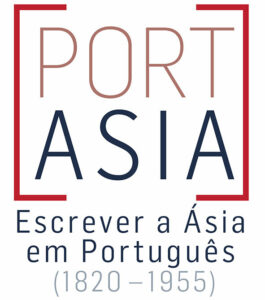Project
PORTASIA – ASIAN WRITING IN PT: MAPPING LITERARY AND INTELLECTUAL ARCHIVES IN LISBON AND MACAO (1820-1955) seeks to map 5 libraries in Lisbon and Macao to identify books and documents in Portuguese (PT) by Asian authors. This collection of printed sources, typescripts and manuscripts will be presented to the reader/user through a printed catalogue. Supported by an open-access website, it will disclose the existence of such materials and authors as a new corpus for further study and analysis. Research is built on the premise of a PT Asian writing that needs to be identified and disclosed. The team will provide evidence of its existence from 1820 to 1955, a period extending from the press boom in the PT colonies until the year of the Bandung Conference.
The criterion for author selection is the strong connection, biographical or other, to the territories of Mozambique, Malacca, Goa, Macao and Timor. Although all can be seen as Asian, we cannot follow an ethnical/national criterion since the authors have plural origins, as shown by our previous research: they may be native, luso-descendants, or from creole communities. Their written work can be found in both Asia and the former colonial metropolis, particularly in the capital’s institutions. Research will also be conducted in two libraries in Macao to build research networks not limited to Portugal. The collections of these multiple institutions will be cross-referenced and the time span and spatial frame will allow us to successfully gather a meaningful corpus of texts.
The project aims to create an archive within the archives, made of documents seen as marginal inside the context both of PT empire and of Asian archives. Our understanding of archive is twofold: as a metaphor for these writing traditions and taken literally as the only way of accessing a PT Asian writing, a concept so far unexplored. This writing needs to be reconstituted from the very materials that sustain it, including the archives where it is preserved.
Our methodological approach is based on direct contact with the archives to develop critical proposals and explore the hypothesis of writing traditions across several genres, including criticism and literature. Our intention is to put forth an idea of literature that involves other forms of intellectual production (historiography, ethnography), oftentimes more common in small millieux and prone to better results than research focused only on the typical forms of creative writing.
This problem has rarely been raised because PT studies are still rooted in a nationalist view of the PT language map consisting solely of 8 nations. PORT ASIA thus seeks to overcome this nationalist and language-based view of literary production in PT.
The production of those Asian spaces has often been posited in independent terms (literature of Macao, Goan literature); other territories are undergoing an identification phase (Timor, Malacca); and others are still not considered from this perspective (Mozambique), even if pertaining to an Afro-Asian platform of material circulation and symbolic goods. Therefore, PORT ASIA is a 1st research phase about the possibility of the autonomous existence of Asian literatures/writing traditions in PT.
Before creating a new subfield within PT studies, our aim is to propose a comparative approach to these insular territories (a metaphor for their scattered nature), to which we do not intend to ascribe a unity beyond their inscription within the Asian/Afro-Asian context. Indeed, the project brings an Asian-centric reading, and stresses that the PT language may bind the materials, but it does not necessarily guarantee unifying meanings for this written production. Hence, the project draws from the conceptual/methodological instruments of Comparative Studies, with a strong interdisciplinary lens, working towards the exploration of a new and localized field of knowledge.
PORTASIA is linked to the key research areas developed by the PI. PORTASIA also builds on previous work carried out by the PT orientalism group at CEC, which has already hosted other FCT-funded projects (TECOP, under the Co-PI’s supervision). In addition to TECOP, both the PI and the Co-PI have significant experience in similar research projects (Fapesp) and in supervising funded projects (Gulbenkian). All team members have archival research experience; their preliminary research has shown that the intended material is quantitively manageable within the time frame of this Explanatory Project and that the selected archives are an appropriate point of departure.
The ultimate goal is to create a catalogue supported by an open-access website that can work as important tools and also as key bibliography on this intellectual production, enabling a comparative analysis. The catalogue/website will be a coherent collection of references, providing the physical location of the existing collections to enable the comprehensive study of these scattered materials.
Esta plataforma é financiada por fundos nacionais através da FCT – Fundação para a Ciência e a Tecnologia, I.P., no âmbito do projeto EXPL/LLT-LES/1191/2021.
Parceiros

